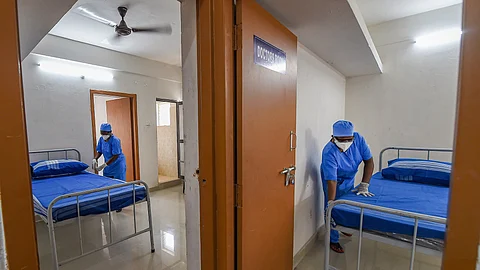

A health alert has been issued in Kerala’s Kozhikode after two cases of unnatural fever deaths were reported in the past two weeks, suspected to have been caused by Nipah virus infections. One of them, a 49-year-old man, died on August 30, and another 40-year-old person died on September 11. The alert was issued by the Kerala Health Department after the two deaths were reported in a private hospital in Kozhikode. Health department officials said they suspect Nipah infection, and have sent the samples to ICMR-National Institute of Virology, Pune. The results will be known by September 12, Tuesday evening.
Relatives of one of the deceased have been kept in isolation at a private hospital in the district. As per reports, three persons are in isolation including two children. All three of them have a fever. A high-level meeting was held under the leadership of Health Minister Veena George to assess the situation.
After the first Nipah virus outbreak in Kerala in 2018, there were 17 deaths and 18 confirmed cases as of June 1, 2018. However, when a second outbreak happened a year later, the state was able to contain it without reporting any deaths. Three years after the first outbreak, another case of the Nipah virus was reported from the state when a 12-year-old boy succumbed to the infection in Kozhikode district in September 2021.
The Nipah virus is an RNA virus first detected in Malaysia in 1998. Fruit bats are natural hosts of this virus, and pigs are intermediate hosts. According to the World Health Organisation’s (WHO) Nipah Fact Sheet, the virus can be transmitted to humans from animals (bats, pigs), and can also be transmitted directly from human-to-human. It appeared in Bangladesh in 2001, and in the same year, a Nipah virus outbreak happened in Siliguri in West Bengal in India. Of the 65 infected in Siliguri, 45 persons died.
“Human infections range from asymptomatic infection, acute respiratory infection (mild or severe) and fatal encephalitis,” states the WHO fact sheet. There are no specific drugs or vaccines for NiV infection. Intensive supportive care is the recommended treatment.